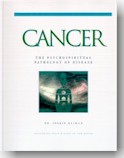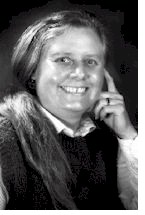

Ingrid Naiman I saw my first cancer patient in 1972. At the time, only two questions were asked of me. In my capacity of a medical astrologer, would I help select a date for surgery and comment on the compatibility of the surgeons and the patient. As it turned out, there were only two dates from which to choose and only two surgeons. Since the patient was scheduled for a double mastectomy, there were to be two teams of surgeons, one operating on each breast.
It was not an auspicious beginning, but I learned a lot as an astrologer if not as a healer. First, I had advised against the one surgeon and more or less signed off on the other. Nine months later, the patient came by my home. She said, "You don't understand." It's true, I didn't. She ripped open her blouse and revealed one perfectly healed surgery site and another that looked like raw hamburger. Had my entrée into the cancer world been totally different, I might have become obsessed over blood chemistry and other objective parts of the healing process, but what I saw was basically inexplicable except in astrological terms since the issue was the rapport between the patient and surgeons, not even electional astrology (the choosing of dates for important events.) If diet or toxicity or even timing were the key to healing, then both sides of this patient would have had the same experience. However, in reality, the two sides of her had totally different experiences so my attention was focused on astrochemistry, the subtle dynamics between individuals that might be karmic in origin. My antennae were busy taking in information on such variables as the motivations people have for becoming surgeons, whether they are healers or people racking up funds in tax sheltered investments. To be absolutely honest, I wasn't interested in any of the issues on which I have published in more recent years. 
My first major publication on cancer was astrological. It was based on a series of letters to my cousin who is also an astrologer. A mutual friend said to my cousin as she was being wheeled into surgery for brain tumors, "Tell Ingrid I want to talk to her when I come out of the anesthesia." This was one of those situations that is difficult to describe to outsiders. We astrologers have our own vocabulary and we speak easily to one another because of our shared perspectives. Suffice it to say that after my first patient in 1972, I had taken over the research of another astrologer who was trying to determine predisposition to cancer. I still feel that this work has its place, but what happened in my life is that from the time of the publication of that book, my phone never stopped ringing. For many years now, I have worked with people who are facing the issues surrounding cancer. My role has been different with each person. Sometimes, I am the one to help brainstorm the question of "why?" and sometimes I am just there to listen, and sometimes I am there to offer suggestions based on my long experience. Typically, those who consult me begin with an account of all they have done since their diagnosis. This usually includes either the shock of discovering he or she has cancer or the hesitant admission, "I just knew." Then, there are accounts of the protocols, those that worked and those that did not. Since I offered nothing in the way of protocols, I tended for many years just to make mental notes because I was looking for the common denominators in the success stories. This said, I wouldn't like to give the impression of passivity because I feel I have been the champion for many patients, the psychic and psychological force that took up the cause of Life and challenged Death. Though this is an absolutely invisible part of my work, I feel I have been battling Death for many decades, perhaps many incarnations.
Speaking Plainly As I launch this web site in late May 2001, I am, to tell the truth, tired of walking on egg shells, trying to find scientifically acceptable ways to express my knowledge. What do I mean? If I discuss diet or herbs, people have a right to know the basis of a claim or point of view, and they have a million or more web sites to compare to one another. However, I am not in a position to comment on anyone else's point of view or scientific conclusions. I am simply one person with a lot of clinical experience, meaning I have seen people as a counselor and observed and made notes. I also read a lot, attend professional conferences, network with countless other practitioners, and visit other web sites. I'm well-informed, but it is simply impossible to have consensus on anything. I hired someone to research some details of a cookbook I was writing for patients. The book was removed from my home when I was away, but the person who was doing the research kept bemoaning, "Why is there no agreement?" In our scientific world, pseudoscientific world, we expect a number to become the proof of a proposition, but the question is always how these numbers are generated, by whom, and for what purpose. I have never had a vested interested in the outcome and therefore never had to design a study to prove what I wanted. I don't sell strawberries or soy milk or broccoli or tomatoes so the only basis I have for a dietary suggestion is what I personally have found works best for the most people. With herbs, it isn't quite the same. I have sold herbs since 1986 and was interested in them since 1968. I hadn't been in the "herb business" long at all before I found out that sales reps can be as obnoxious as in the pharmaceutical business. They make their livings on fashions in herbs—and, make no mistake, there are fashions in hte herb just as in the apparel and automobile businesses. Fashion is seldom good medicine, and sometimes, it can be dangerous. It's also really unfortunate when a perfectly sound herbal tradition with thousands of years of history is turned upside-down because hype for something we will forget tomorrow. It's even more dangerous that the pharmaceutical industry is threatened by natural medicine. It is buying its way into the herb business and using its methodology to monopolize medicine. It is making standardization and potent extracts appear to be superior to synergistic formulae that have stood the test of time. It is making synthetic drugs with herbal names and putting fancy packaging and prices on things that are probably better if picked right in your own garden. Am I sure about these allegations? Yes, absolutely! What is happening on the Planet now is very challenging. Pasteur has been replaced by the Genome Project and grants to research microorganisms are redirected to the more promising investigations of DNA. For the first time in history, drugs are fast-tracked and approved because they represent a promising new technology; and even patents are being issued because they, too, are "promising." When are we going to tire of Madison Avenue's promises? The fact is that many of these new technologies are unproven, untested for safety, unregulated by anything moderately resembling common sense, and unknown in terms of their consequences. Genetically modified food hit the market only a few years ago. I remember being alarmed when canola oil was suddenly the big "it." I had never seen anything in the health foods industry move with such speed. So, relying on my formative years on Wall Street (1964-66), I realized that this "natural" product couldn't possibly be natural or no one would have invested so heavily in it. Right I was and now only a few years later, it is impossible to buy anything off the shelves in the super market that you can be absolutely certain contains nothing genetically modified. You can't even be certain that what you grow in your own garden has not been cross-pollinated by a GMO species, if it is even a species and not a conjuration? Science has truly become an idol, but I personally believe its lofty potential and fundamental interest in truth has been sold out to industry and the enormous megalomania that drives our modern world. I have hence become a detractor. I was born into a family of scientists and respected their love of knowledge and emphasis on correct understanding. However, as time has moved on, I have been unable to trust what passes for science and have, partly as penance for my own misdirected energies, gone on a quest for the wisdom of the ages. This has included a tremendous emphasis on organic, natural, and unprocessed food and medicine; passionate environmental activism and conservationism; and a new web site in which I plan to speak plainly and forget about the eggshells. If questions about the content of this site arise, please contact your health care provider and suggest that your practitioner contact the web hostess. Blessings! Copyright by Ingrid Naiman 2001, 2006
|
Ingrid Naiman
9 April 2006

Sacred Medicine Sanctuary
Copyright by Ingrid Naiman 2001, 2006, and 2014
The information on this site is presented as a public service. The site owner, author(s), Seventh Ray Press, Sacred Medicine Sanctuary, server, and web manager(s) are not responsible for how the information is applied nor for any outcomes.
The information provided on this site is for educational and informational purposes only. The statements and products have not been evaluated by the Food and Drug Administration and are not intended to diagnose, treat, cure, or prevent any disease.
The material on this site should not be used to replace professional medical care. You should always consult a health professional about specific health concerns and problems.

 Because
I'm curious, I think I probe deeper than some. . . and quite
naturally, I have also formed opinions. These can be divided
into many categories: lifestyle, diet, herbs, psychological
forces, and spiritual expression. In my second major book on
cancer, I describe cancer as a disease of congestion in the
experiential realm. It was just a sentence in the preface of
a book otherwise focused on botanical cancer treatments, but
I want to develop this thought on this web site.
Because
I'm curious, I think I probe deeper than some. . . and quite
naturally, I have also formed opinions. These can be divided
into many categories: lifestyle, diet, herbs, psychological
forces, and spiritual expression. In my second major book on
cancer, I describe cancer as a disease of congestion in the
experiential realm. It was just a sentence in the preface of
a book otherwise focused on botanical cancer treatments, but
I want to develop this thought on this web site.